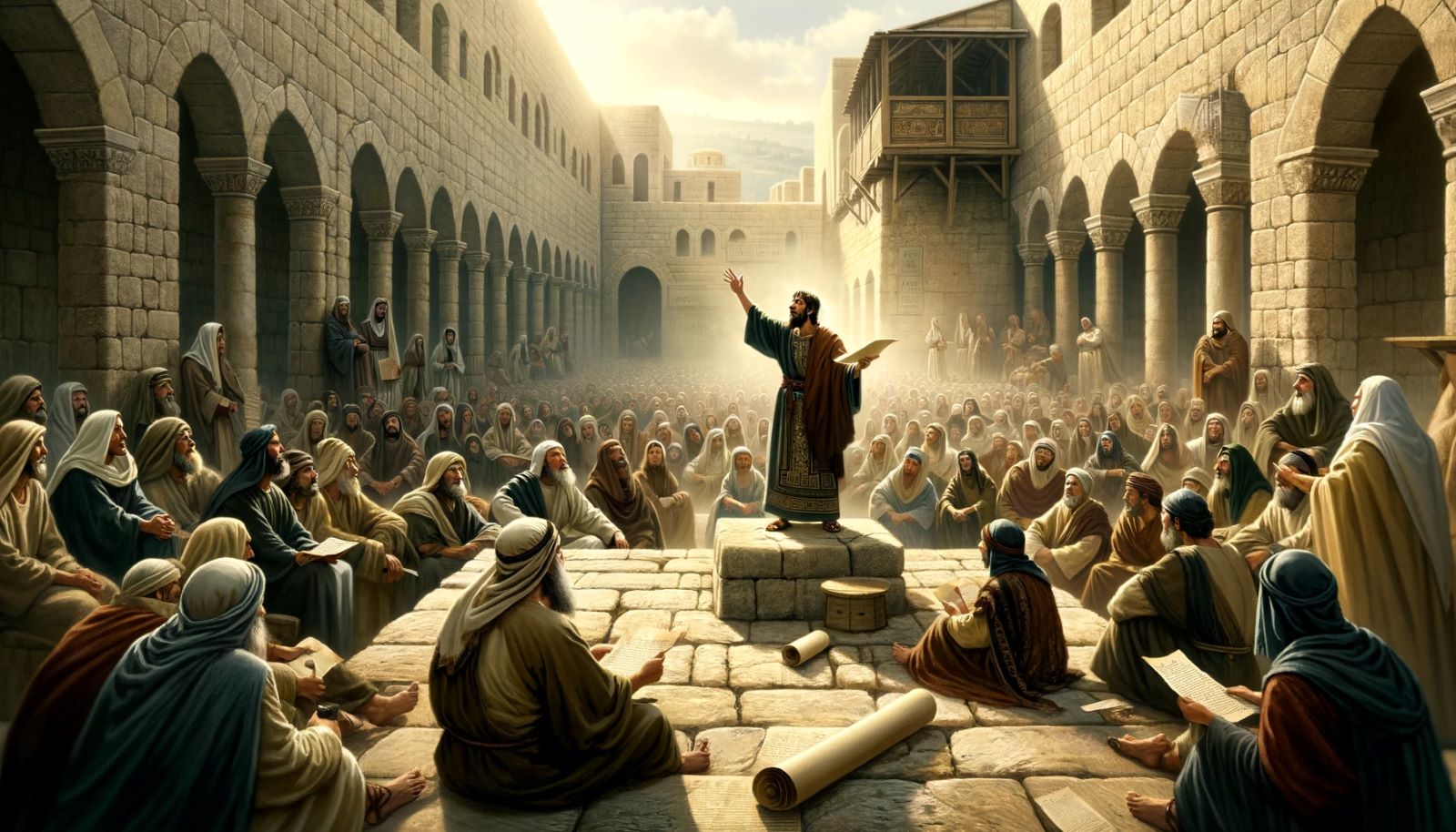Home>Bible Facts>Who Brought Saul To The Apostles


Bible Facts
Who Brought Saul To The Apostles
Published: February 17, 2024
Ericka Andersen, an editor at Christian.net, expertly merges digital strategy with content creation, focusing on faith and societal issues. Her communication skills enhance the platform's engaging narratives, fostering meaningful dialogue on belief's impact on society.
Discover the intriguing Bible facts about who brought Saul to the apostles. Uncover the fascinating story and its significance in the scriptures. Explore more with us!
(Many of the links in this article redirect to a specific reviewed product. Your purchase of these products through affiliate links helps to generate commission for Christian.net, at no extra cost. Learn more)
Table of Contents
Introduction
The story of Saul's conversion and his encounter with the apostles is a remarkable and pivotal event in the New Testament. It is a powerful demonstration of divine intervention and the transformative power of faith. This significant event not only changed the course of Saul's life but also had a profound impact on the early Christian community.
Saul, who later became known as the apostle Paul, was initially a fervent persecutor of the early Christians. His zealous opposition to the followers of Jesus led him to participate in the persecution and imprisonment of many believers. However, everything changed dramatically when he experienced a divine encounter on the road to Damascus.
The account of Saul's conversion is a testament to the boundless mercy and grace of God. It serves as a reminder that no one is beyond the reach of God's love and transformative power. This extraordinary event also underscores the significance of divine calling and the potential for radical transformation in the lives of individuals.
The subsequent interactions between Saul and the apostles are equally compelling. They exemplify the complexities of human relationships, the challenges of forgiveness, and the unifying power of faith. The convergence of these elements creates a narrative that resonates with readers across generations and continues to inspire and instruct those who encounter it.
The story of Saul's conversion and his encounter with the apostles is a timeless testament to the enduring themes of redemption, forgiveness, and the unrelenting pursuit of God's purpose. It serves as a foundational narrative in the New Testament, offering profound insights into the nature of faith, the power of divine intervention, and the transformative potential inherent in every individual's journey.
Read more: Who Brought Catholicism To Poland
The Conversion of Saul
The conversion of Saul, later known as the apostle Paul, is a pivotal and transformative event in the New Testament. Prior to his conversion, Saul was a zealous persecutor of the early Christians. His fervent opposition to the followers of Jesus led him to participate in the imprisonment and persecution of many believers. However, everything changed dramatically when he experienced a divine encounter on the road to Damascus.
As Saul journeyed to Damascus with the intent of arresting and persecuting more followers of Jesus, a blinding light from heaven suddenly surrounded him. Falling to the ground, he heard a voice saying, "Saul, Saul, why are you persecuting me?" Trembling and astonished, Saul asked, "Who are you, Lord?" The voice replied, "I am Jesus, whom you are persecuting." This encounter left Saul blinded and profoundly shaken.
Following this extraordinary experience, Saul was led into the city of Damascus, where he remained blind for three days. During this time, he neither ate nor drank, consumed by the weight of the encounter and the revelation of Jesus' identity. Meanwhile, the Lord appeared in a vision to a disciple named Ananias, instructing him to go to Saul and restore his sight. Ananias, initially hesitant due to Saul's notorious reputation, obeyed the Lord's command and went to the house where Saul was staying.
Upon meeting Saul, Ananias laid his hands on him, and something like scales fell from Saul's eyes, restoring his sight. Ananias then conveyed the Lord's message to Saul, revealing his divine purpose and commission as a chosen instrument to carry the name of Jesus before the Gentiles, kings, and the people of Israel. This pivotal moment marked the beginning of Saul's transformation from a persecutor of the faith to a passionate advocate for the gospel.
Saul's conversion is a profound illustration of divine intervention and the boundless mercy of God. It serves as a testament to the transformative power of faith and the unyielding pursuit of individuals by the grace of God. This extraordinary event not only changed the course of Saul's life but also had a profound impact on the early Christian community, laying the foundation for his future ministry and profound influence on the spread of Christianity.
The conversion of Saul stands as a timeless reminder that no one is beyond the reach of God's love and transformative power. It exemplifies the radical nature of divine encounters and the potential for profound change in the lives of individuals, regardless of their past actions or beliefs. This remarkable event continues to inspire and instruct believers, serving as a testament to the enduring themes of redemption, forgiveness, and the unwavering pursuit of God's purpose in the lives of individuals.
Ananias and His Role
Ananias, a devout disciple of Jesus residing in Damascus, played a crucial role in the narrative of Saul's conversion. His obedience to the divine instruction and his pivotal encounter with Saul exemplify the profound impact of individual faithfulness and obedience in the unfolding of God's redemptive plan.
When the Lord appeared to Ananias in a vision, instructing him to go to the house where Saul was staying, he initially expressed understandable apprehension. Aware of Saul's reputation as a persecutor of the believers, Ananias questioned the wisdom of this directive. However, the Lord reassured Ananias, emphasizing Saul's role as a chosen instrument to carry the name of Jesus before the Gentiles, kings, and the people of Israel. Encouraged by this divine reassurance, Ananias demonstrated unwavering faith and obedience by following the Lord's command.
Ananias' obedience and willingness to set aside his initial reservations reflect a profound trust in the divine guidance and a deep commitment to serving the purposes of God. His journey to the house where Saul was staying marked a significant turning point in the narrative, as it led to the restoration of Saul's sight and the revelation of his divine commission.
Upon reaching the house, Ananias laid his hands on Saul, and something like scales fell from his eyes, restoring his sight. This miraculous restoration not only signified the physical healing of Saul but also symbolized the spiritual transformation and enlightenment that accompanied his encounter with the Lord. Furthermore, Ananias conveyed the Lord's message to Saul, revealing his divine purpose and commission as a chosen instrument to carry the name of Jesus before the Gentiles, kings, and the people of Israel.
Ananias' pivotal role in Saul's conversion underscores the significance of individual obedience and faithfulness in the outworking of God's redemptive plan. His unwavering commitment to following the Lord's guidance, despite his initial reservations, serves as a powerful example of the transformative impact of obedient faith. Through Ananias' obedience, Saul's spiritual and physical restoration was realized, setting the stage for his future ministry and profound influence on the early Christian community.
The narrative of Ananias and his role in Saul's conversion serves as a compelling reminder of the profound impact of individual obedience and faithfulness in advancing God's redemptive purposes. It highlights the transformative power of unwavering faith and the pivotal role that individuals play in the outworking of divine plans. Ananias' obedience and pivotal role in Saul's conversion continue to inspire and instruct believers, underscoring the enduring themes of divine guidance, obedience, and the transformative power of faith in the unfolding of God's redemptive narrative.
The Meeting with the Apostles
Following his transformative encounter and restoration of sight through Ananias, Saul sought to join the disciples in Damascus. However, his reputation as a persecutor of the faith preceded him, leading to understandable apprehension and skepticism among the believers. It was Barnabas, a respected figure among the disciples, who played a pivotal role in facilitating Saul's acceptance into the community of believers.
Barnabas, known for his encouragement and unwavering faith, took Saul under his wing and introduced him to the apostles. He recounted Saul's encounter with the Lord on the road to Damascus and the subsequent restoration of his sight through Ananias. Barnabas' testimony served to alleviate the apprehensions of the apostles, paving the way for Saul's acceptance into the community of believers.
The meeting with the apostles marked a significant juncture in Saul's journey of transformation. It was a moment of reconciliation and acceptance, as the former persecutor of the faith was embraced by the very community he once sought to dismantle. This powerful demonstration of forgiveness and reconciliation underscored the unifying power of faith and the transformative potential inherent in the redemptive work of God.
Saul's encounter with the apostles also provided an opportunity for him to share his testimony and the profound revelation of Jesus' identity. He boldly proclaimed Jesus as the Son of God and passionately preached the message of salvation, demonstrating a fervent zeal for the gospel. This pivotal interaction with the apostles marked the beginning of Saul's integration into the early Christian community and set the stage for his future ministry and profound influence on the spread of Christianity.
The meeting with the apostles serves as a testament to the unifying power of faith and the transformative nature of divine encounters. It exemplifies the complexities of human relationships, the challenges of forgiveness, and the profound impact of reconciliation within the community of believers. Saul's acceptance into the fold of the apostles symbolizes the boundless mercy and grace of God, highlighting the potential for radical transformation and reconciliation in the lives of individuals.
This pivotal meeting not only solidified Saul's place within the early Christian community but also laid the foundation for his future ministry and profound impact on the spread of the gospel. The narrative of Saul's meeting with the apostles continues to inspire and instruct believers, serving as a timeless testament to the enduring themes of reconciliation, acceptance, and the unifying power of faith within the community of believers.
Conclusion
The narrative of Saul's conversion and his subsequent interactions with Ananias and the apostles is a profound testament to the transformative power of faith, the unyielding pursuit of God's purpose, and the unifying nature of divine reconciliation within the early Christian community. Saul's journey from a zealous persecutor of the faith to a passionate advocate for the gospel embodies the radical transformation and redemption made possible through divine encounters and unwavering faith.
The pivotal role of Ananias in Saul's conversion serves as a compelling example of individual obedience and faithfulness in the outworking of God's redemptive plan. Ananias' unwavering commitment to following the Lord's guidance, despite his initial reservations, underscores the transformative impact of obedient faith and the pivotal role that individuals play in advancing God's purposes. His obedience led to the restoration of Saul's sight and the revelation of his divine commission, setting the stage for Saul's future ministry and profound influence on the early Christian community.
Furthermore, Saul's meeting with the apostles in Damascus marked a significant moment of reconciliation and acceptance within the early Christian community. Despite his notorious reputation as a persecutor of the faith, Saul was embraced by the very community he once sought to dismantle. This powerful demonstration of forgiveness and reconciliation underscores the unifying power of faith and the transformative potential inherent in the redemptive work of God. Saul's acceptance into the fold of the apostles symbolizes the boundless mercy and grace of God, highlighting the potential for radical transformation and reconciliation in the lives of individuals.
The enduring themes of redemption, forgiveness, and the unwavering pursuit of God's purpose resonate throughout the narrative of Saul's conversion and his interactions with Ananias and the apostles. This timeless account continues to inspire and instruct believers, serving as a testament to the profound impact of divine encounters, obedient faith, and the unifying power of reconciliation within the community of believers.
In conclusion, the story of Saul's conversion and his encounter with the apostles stands as a timeless testament to the enduring themes of redemption, forgiveness, and the unrelenting pursuit of God's purpose. It serves as a foundational narrative in the New Testament, offering profound insights into the nature of faith, the power of divine intervention, and the transformative potential inherent in every individual's journey.















